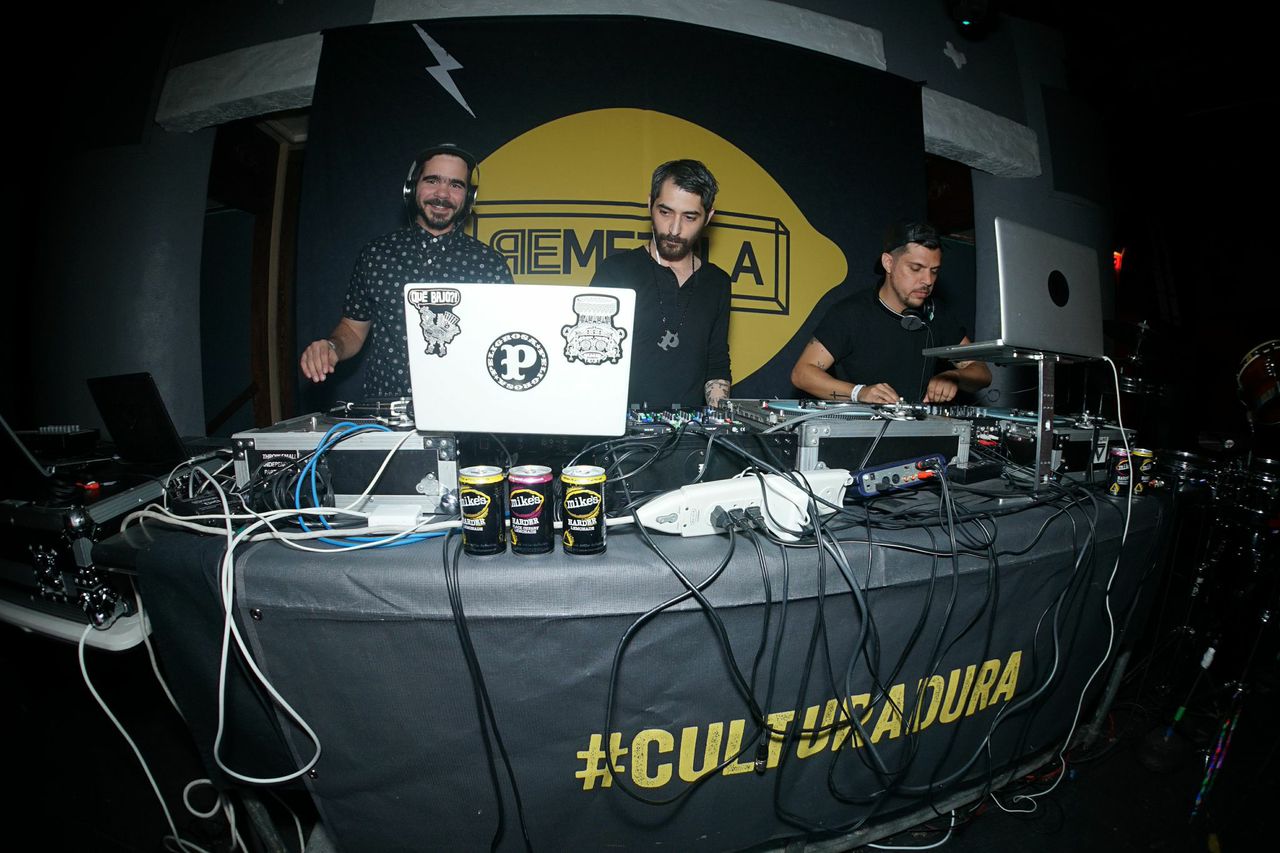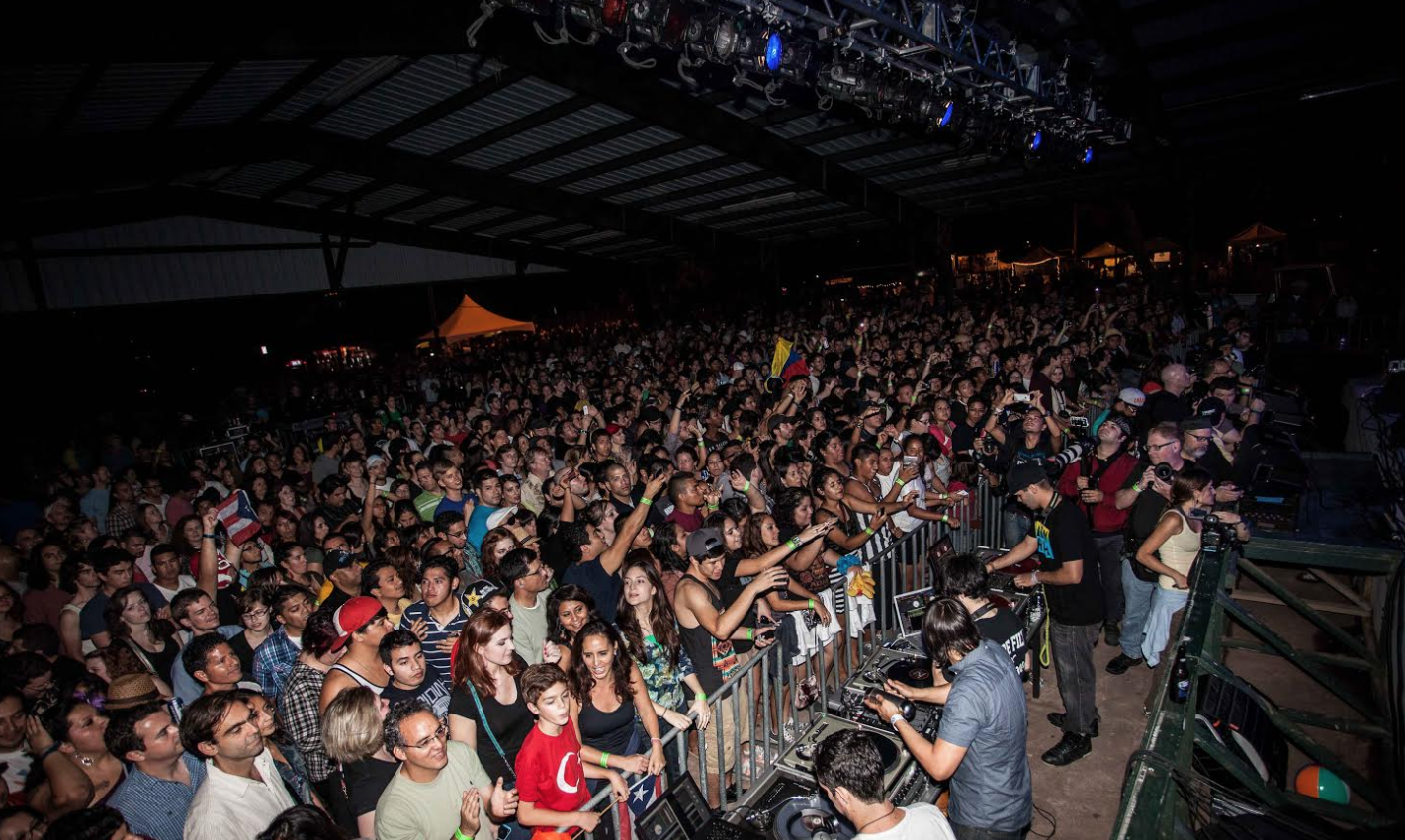As a space to celebrate to the shared experiences of a community with complex cultures and identities, the collective, recurring party, and record label known as Peligrosa has become Austin’s home for revisiting and re-energizing sounds of the Global South of the past, present, and future. Now gearing up to ring in its anniversary this Friday after a 10-year run with over 300 previous guests from around the world, this milestone is a celebration of naturally unfolding growth that came, quite simply, out of the crew playing the music truest to their own experiences.
Founder Orión Garcia tries to capture the power of Peligrosa with an anecdote. “I was trying to explain to this guy the other day – this guy that plays bluegrass Appalachian guitar – what I would call cortavenas, slow music to just cry to. I was trying to explain to him that in my house growing up, we would dance to sad shit. You aren’t jumping around like Beastie Boys…you share your sorrow, you build your resolve for your own love quarrels, or whatever. And for this guy, it was a completely foreign idea; he was saying, ‘We’d never dance to any of that. That’s ridiculous; it’ll never happen.’ But when I listen to bluegrass and Appalachian guitar music, I just want to slow dance with my girlfriend. Is that weird? Then come to Peligrosa. We’re just keeping Austin weird.”

Garcia lived in Germany until the age of 13, then moved to Georgetown, a small city north of Austin before eventually settling there in 1999 (“I’m a Texan for all intents and purposes,” he says). He embodies the experience of growing up, in his own words, “as sort of a fish out of water…kind of being too white to be Latin, too Latin to be white. I don’t conform very well to a lot of things; I think I’m very aware of where things come from and why they’re being used in the way they’re being used.”
Peligrosa first grew out of a Friday night residency at Creekside, the club now known as Empire. After about four years into his time there, Orión began to hold a monthly party to play sounds that catered to a less mainstream Austin crowd. He began inviting other DJs that have now become longstanding Peligrosa residents, including Manolo Black and Hobo D, who spent several years with Peligrosa before heading off to Korea for a job opportunity.
Each DJ brought different diasporic sounds through their crates. Hobo D held down a heavy regimen of vinyl, 45s, Discos Fuentes archives, and had a penchant for boogaloo deep cuts. Manolo Black skewed closer to samba, Brazilian archives, and Mexican cumbia vibes, while Orión championed Colombian cumbia and Puerto Rican salsa. Between all of them, they filled in the gaps. They slowly met more folks along the way that were playing out similar sounds and had something to add; Pagame was next to join, bringing in a selection of backpack rap, while also integrating eclectic electronic sounds mixed in with traditional music from Mexico, as well as the crew’s first Ableton sets. As the rest of Peligrosa was transitioning from vinyl or Serato setups, Orión recalls that Pagame’s Ableton setup “gave him the ability to chop stuff up and catch loops a little quicker than us…it changed up the music that was played, and I think that helped a lot in creating the party vibe.”
Peligrosa has grown over the years to include El Dusty, Chorizo Funk, King Louie, Sonora, VJ 4th Wall, but in live performances, the format has always included a 2×4 setup – two mixers, and four turntables, sometimes even extending to three setups. As a nod to the high-octane energy of the parties, and also to the camaraderie between the residents, there’s no tradition of working out set times in advance. Instead, the crew relies on the initiative of each person to make it up to the stage and hop on for time to spin when the opportunity arises. This comes from the collaborative origins of the party. “Everyone wants to play, so one person would play instrumentals, another person would play a capellas, vice versa. Another guy’s scratching [and] we’re just adding little things while someone else is playing.”

Orión remembers feeling the party was subversive in its early phases. “I’d always get comments like, ‘I can’t believe you can play this kind of music here.’ I always felt like, why not; I always had that in the back of my head, that I know this could easily be a situation where club owners are like, ‘No you can’t play that shit here, and we’ve encountered those kinds of owners and managers before.’”
“There’s so much trouble in the world that you wanna go to a place where you rekindle some joyous memories.”
As Peligrosa has evolved to include a collective, an eagerly anticipated home for artists visiting Austin during SXSW, and a label, Orión reflects that the experience of organizing has “definitely changed from raging and throwing a party, to having to organize and do logistical shit, but it’s worth it…I don’t think I could be showing up and partying like I was back in 2007. I would probably be dead by now.”
With this growth also comes a process of formalizing the operation and making it sustainable, a challenge that encompasses working collectively while transitioning the project into a business. Peligrosa started around the same time as other U.S.-based, globally-inspired parties, like San Francisco’s Tormenta Tropical and New York’s Que Bajo?!, and each crew has grappled with how to convert the project into a sustainable outfit. As Orión puts it, “It’s hard though, working as a collective, trying to turn it into a business; there’s no guidebook on that. You can find plenty of information on how to start up a business, or plenty of info on how to start a collective, but there’s not plenty of info on how to transition from being a collective to a business while still maintaining either side of some of what’s required from that.”
What’s remained consistent is the community that’s grown around Peligrosa, with many people still attending the party after supporting it in its earliest days. The project has flourished by embracing fluidity and change. With the growth of the Internet and increased accessibility to geographically-distant sounds, the soundscape has evolved in tow; if someone is feeling like digging heavier into baile funk that month, for example, then that changes the vibe of that month’s edition. “It’s always changing and evolving, and I think [the fact] that no two Peligrosas have been the same is partly what keeps people coming back to this party.”
Orión recognizes what it means to organize a party that highlights immigrant communities’ experiences and their associated sounds in the current sociopolitical climate. “It’s definitely become more imperative for us as a collective to have a louder voice on some of these issues, even though sometimes we disagree among ourselves,” he reflects. True to Peligrosa’s collaborative nature, the outfit is accepting of different views as well. “The thing we’re learning now is that the process [of discourse] is important, and should be shared in a way that’s non-combative and informative; Peligrosa wouldn’t have lasted that long if everyone was just going to be stubborn about their shit. We’re a little more fluid; we’re going to figure it out as we go.”
In a time of rapidly shifting policy and discourse in the U.S., what remains most powerful for Peligrosa is the source of joy and resistance found in coming back to community and the spaces they’ve created out of love for the project. “For me, it always comes [back to] a joy of playing the music and listening to the music,” Orión says. “Maybe it’s a form of escapism, where it’s like, there’s so much trouble in the world that you wanna go to a place where you rekindle some joyous memories, by any means necessary, you know?”
Peligrosa takes over the North Door on Friday, December 15 with special guests Craze, Riobamba, Bombón, Mamis, Brukout, Chulita Vinyl Club, Jefferson D Lion, Chingo Bling, and Peligrosa residents. If you can’t attend in the IRL, be sure to check out Peligrosa’s 10 Year Anniversary Compilation available this Friday on Spotify or Apple Music. It features the party’s extended family and past guests, including Raka Rich, El Dusty, Niña Dioz, and Dave Nada, as well as standout track “A Mi Lado,” a blissful, hypnotic cumbia from Mexico City’s Sotomayor, premiering exclusively at Remezcla above.







